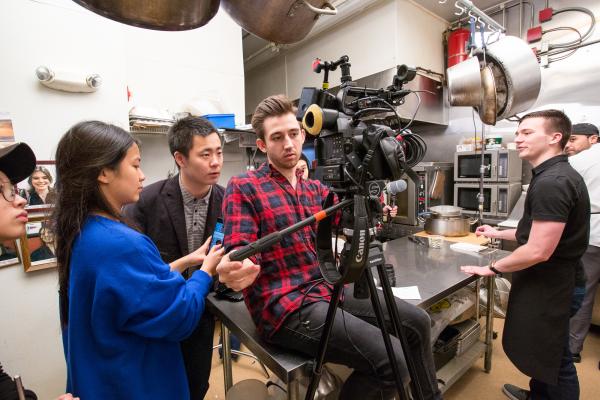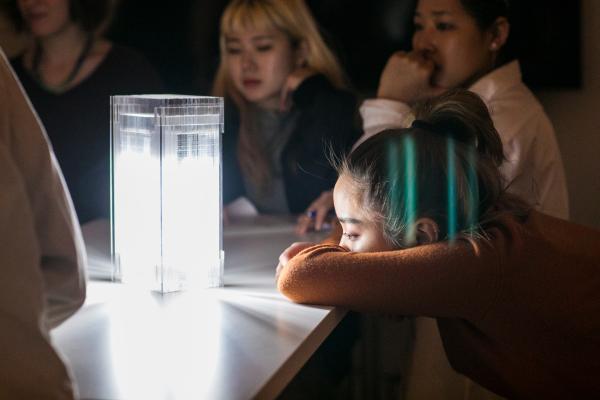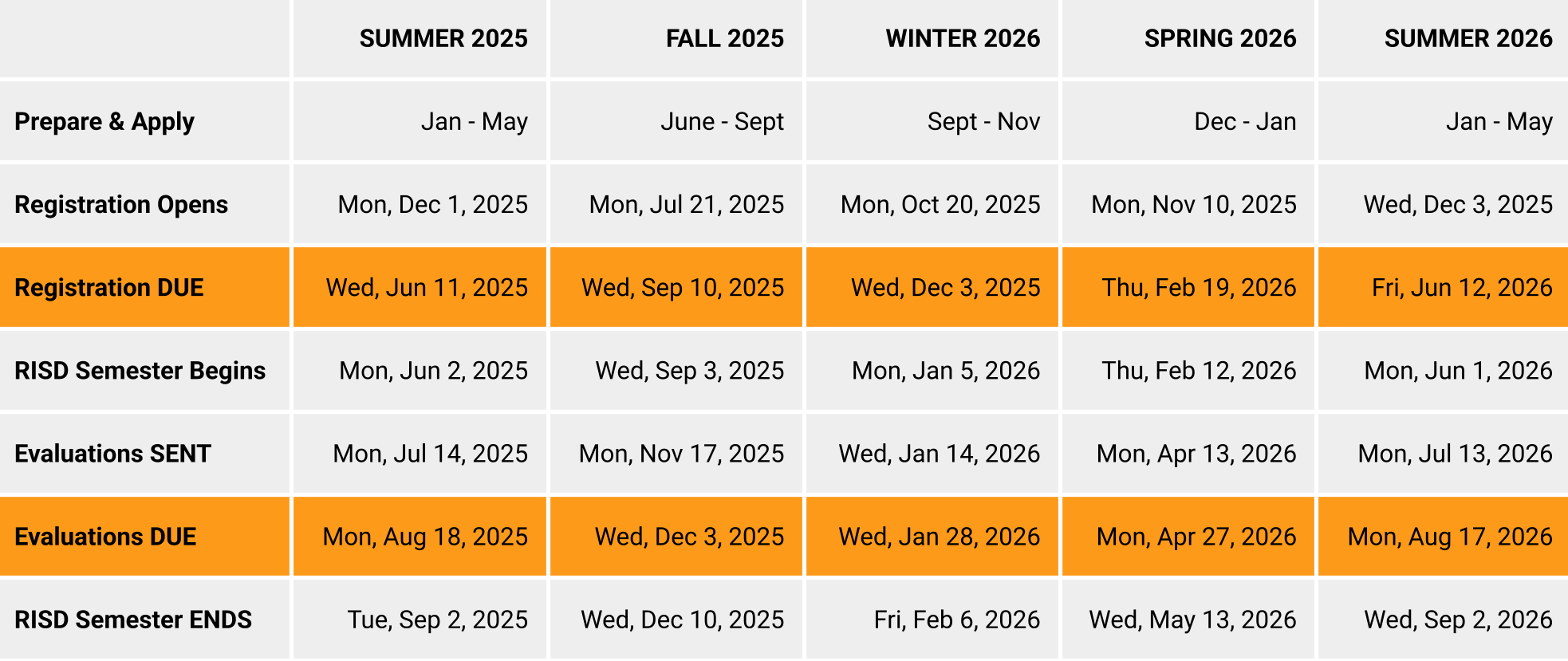Learn the basics of the internship process at RISD.
What is an internship experience?
Why do students do internships?
What qualifies as an internship for credit?
How do students find internships?
Where have students worked as interns in the past?
What time of year can students do an internship?
What are the guidelines for in person, hybrid, and remote internships?
What about paid versus unpaid internships?
When can undergraduate students participate in an internship and how many credits can they earn?
When can graduate students participate in an internship and how many credits can they earn?
What do international students need to know about internships?
How do I register an internship experience?
Is there internship funding available through RISD?
How do you know if an internship is legitimate or not?

What is an internship experience?
An internship resembles a real job in many ways. It is an experiential learning opportunity that integrates knowledge and theory learned in the classroom with practical application and skills development in a professional setting. Both designers and fine artists perform internships in a variety of settings in the professional world. Employers may also identify interns for future permanent positions as students approach graduation.

Why do students do internships?
Internships provide an opportunity for students to learn from experienced professionals in their field. Student outcomes include a stronger resume, valuable professional connections, and exposure to career fields and job markets that can inform their career path.

What qualifies as an internship for credit?
Internships for credit must meet the following criteria:
- Facilitate growth and development of the student’s knowledge and skills that will compliment academic studio and classroom instruction.
- Internships for academic credit must be approved by the student's academic department through a formal registration process.
- Internship evaluations must be completed by the student and their supervisor in ArtWorks. These evaluations are recorded in ArtWorks to be approved by the academic department and reported to the RISD Registrar.

How do students find internships?
The RISD Career Center supports students in all phases of securing an internship: identifying opportunities, developing their resume and cover letter, reviewing their portfolio/reel, interviewing, and registering their internship. Students can meet with a career advisor to get support in all of these areas. Students can also use ArtWorks, an online platform for RISD students and alumni to find internships, jobs, and artist opportunities. Additionally, the Career Center also organizes Internship Connect (a fall internship fair) each year to connect students with internship opportunities.
Meet With A Career Advisor
ArtWorks
Internship Connect

Where have students worked as interns in the past?
The Career Center has developed a comprehensive list of companies and organizations that have hosted RISD interns. You may view the list by clicking on the link below.
List of Employers Hosting RISD Interns

What time of year can students do an internship?
Summer is the most popular time for internships for both students and employers. Wintersession internships occur over 5 weeks in January and February. Students may work as part-time interns during fall and spring semesters if their class schedule allows. Students should confirm with their academic department that they are eligible to do an internship during the academic semester they are planning for, as departmental rules may vary.
RISD 2025-26 Internship Deadlines and Timetable
Internship Deadlines and Timetable

What are the guidelines for in person, hybrid, and remote internships?
Students should confirm with their academic department that they are able to do remote / hybrid internships for academic credit, as departmental rules may vary. Below are the essential guidelines for students and employers to consider:
- Confirm the supervision arrangements for the intern including: regularly scheduled check-in meetings to review work/projects, respond to questions, and monitor progress and outcomes.
- Confirm the approach to check-in meetings: In person, Zoom, Skype, Google Hangouts, Google Chat, Phone, and/or other modalities.
- Arrange for meetings between the supervisor, intern and other staff to orient the intern to their job and work culture.
- Discuss access to any necessary technology and tools that are required to perform the job (i.e. software, proprietary programs, shared files and/or other equipment).

What about paid versus unpaid internships?
Paid internships
These are internships that meet state requirements for minimum wage. Gaining academic credit is optional. Recent graduates are also eligible to participate in paid internships.
Unpaid internships
Under federal USA law, if a student is interning at a for-profit company and is unpaid, they are required to receive academic credit. Credit is based on the educational merits of the internship and must be deemed credit worthy by the student's academic department.
Stipends
When considering an unpaid internship, students should ask if stipends for travel, housing or meals are available. A stipend is an allowance or fixed amount of money offered to an intern to help cover these expenses.

When can undergraduate students participate in an internship and how many credits can they earn?
Undergraduate students are eligible to take a fall, spring or Wintersession internship for academic credit once they have successfully completed their freshman year. Students may take their first summer internship for academic credit after their sophomore year.
Summer internships require a minimum of six weeks involvement. Students are strongly advised to do one internship only during the summer.
Wintersession internships can be done for five weeks.
Students must have a cumulative GPA of 3.0 or higher to participate in an internship done for academic credit.
Internships done for academic credit must be approved by the student’s department. They can be taken for 3 credits and must be a minimum of 100 hours total. Internships are graded Pass/Fail. Students may not retroactively register for internships after the semester has passed.
Undergraduate students may take a maximum total of 6 internship credits toward their degree.
ARCHITECTURE STUDENTS: A summer professional internship (ARCH 2199) is required of all BArch and MArch candidates. The internship must be a minimum of 8 weeks, 35 hours per week, for a total of 280 hours.

When can graduate students participate in an internship and how many credits can they earn?
Graduate students are eligible to take an internship for academic credit once their program start date begins.
Summer internships require a minimum of six weeks involvement. Wintersession internships can be done for five weeks.
Students must have a cumulative GPA of 3.0 or higher to participate in an internship done for academic credit.
Graduate students may take a maximum of 3 internship credits for a minimum of 100 hours toward their graduate degree, except where departmental requirements dictate that students acquire more experience beyond three credits.
Internships done for academic credit must be approved by the student’s department. Internships are graded Pass/Fail. Students may not retroactively register for internships after the semester has passed.
ARCHITECTURE STUDENTS: A summer professional internship (ARCH 2199) is required of all BArch and MArch candidates. The internship must be a minimum of 8 weeks, 35 hours per week, for a total of 280 hours.

What do international students need to know about internships?
International students must register their internship and receive academic credit if they are based in the United States during the internship experience.
All undergraduate international and domestic students are eligible to take a fall, spring or Wintersession internship for credit once they have successfully completed their freshman year.
All undergraduate international and domestic students may take their first summer internship for credit after their sophomore year.
International students must be matriculated for three consecutive semesters before they can participate in an internship while based in the United States. If a student takes a gap year they must be matriculated for three consecutive semesters after the gap year to participate in an internship. Students may not retroactively register for internships after the semester has passed.
International Students are required to apply for Curricular Practical Training (CPT) work authorization to do an internship while based in the United States. Students should complete the CPT application in their Terra Dotta portal (located in the Control Center). CPT must be approved before the internship begins.
Contact the International Student & Scholar Affairs (ISSA) for more information and/or questions about CPT.

How do I register an internship experience?
1. Login to ArtWorks and select 'Experiential Learning' on the left-side navigation.
2. Choose 'New Experience' (button is in the upper right) for the internship registration form.
3. Complete the form and submit it.
4. Once the student’s registration is submitted, the ArtWorks system will automatically request approvals from various individuals.
5. Once a student has submitted their internship registration it will take 7-14 days for the internship to be approved and then the student will be eligible to begin working.
Academic credit internship approvers: Internship Manager, Academic Department, Employer Supervisor, RISD Senior Administrator, and Registrar
International students and academic credit internship approvers: Internship Manager, Academic Department, ISSA, Employer Supervisor, RISD Senior Administrator, and Registrar
No credit internship approvers: Internship Manager and Employer Supervisor
IMPORTANT: INTERNATIONAL STUDENTS MUST CHOOSE 'INTERNSHIP TYPE F-1'
Sample Student Evaluation Form
Sample Supervisor Evaluation Form
Student & Employer Internship Agreement
Step-by-Step Guide: Register Your Internship

Is there funding available for internships through RISD?
RISD students may find funding to support a summer internship through a variety of competitive grants. Funding can be used to support a self-directed internship or an internship with a company or organization.

How do you know if an internship is legitimate or not?
Now more than ever, students need to be careful and guard their sensitive personal information. Unfortunately, some scammers may attempt to use fake internship opportunities as a way access your personal information or steal money. To help protect yourself from these situations, review the guidance linked below and always remember you can get in touch with the Career Center for assistance.
Questions?
If you have further questions that are not addressed on this page, please contact internships@risd.edu.


